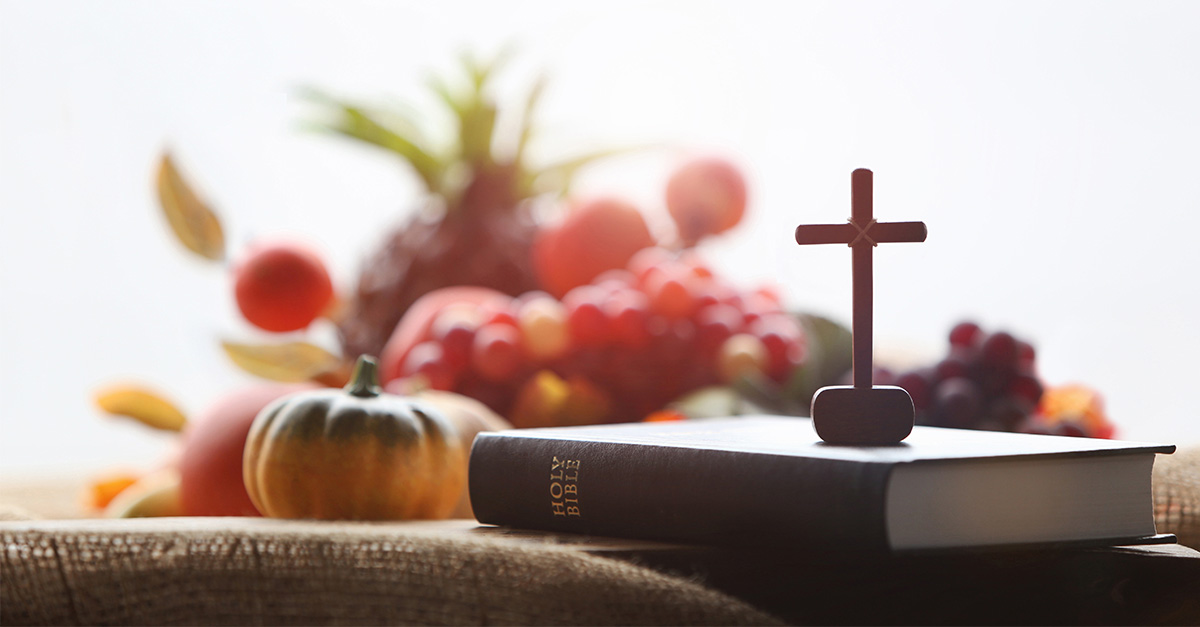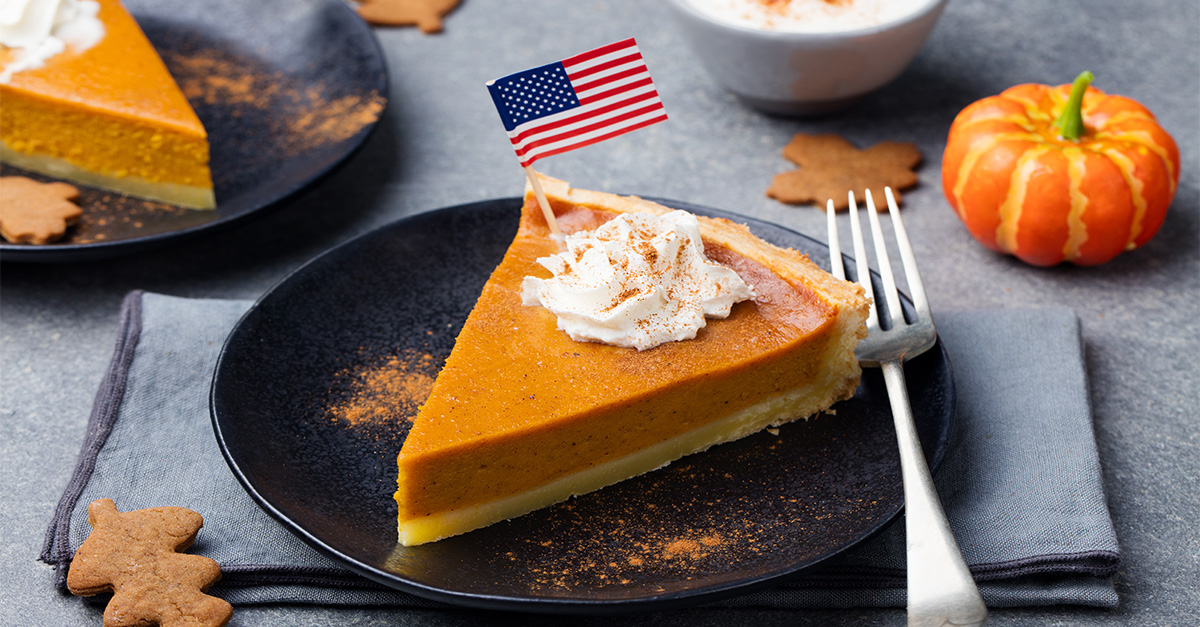


Get a free copy of Parental Rights & Education when you subscribe to our newsletter!

Thanksgiving belongs to us as Christians. It is truly a Christian holiday, one that is deeply rooted in the tradition of expressing gratitude to God. It is a time to reflect on the blessings we have received and to give thanks for them.
Don’t let the consumerism of Black Friday deals and the “LGBTQIA+-ifcation” of the Macy’s Day Thanksgiving Parade fool you — Thanksgiving is a Christian holiday.
Yes, it is a time for turkey, pie, and football. It’s a day when we gather with family and friends to express our gratitude for the blessings we have received. But more significantly it was meant to be a day when we, the creatures, lift our humble eyes to the Creator God and thank Him for the good gifts He so graciously gives to the children of men. So, this Thanksgiving essay will explore the Christian origins of Thanksgiving, referencing the first Thanksgiving celebrations and their unapologetically Christian declarations.
The first Thanksgiving was celebrated by the Pilgrims in 1621, a year after they arrived in the New World. However, it was in 1623 that William Bradford, the governor of the Plymouth Colony, made the first formal Thanksgiving declaration. In his declaration, Bradford expressed gratitude for the abundant harvest and the protection they had received — and attributed their success to God the Father.
He proclaimed:
“Inasmuch as the great Father has given us this year an abundant harvest of Indian corn, wheat, peas, beans, squashes, and garden vegetables, and has made the forests to abound with game and the sea with fish and clams, and inasmuch as He has protected us from the ravages of the savages, has spared us from pestilence and disease, has granted us freedom to worship God according to the dictates of our own conscience.”
This declaration is a clear testament to the Christian origins of the original Thanksgiving. It reflects the fundamental Christian principle of expressing gratitude to God for His blessings, a principle that is echoed in numerous Bible verses. For instance, 1 Thessalonians 5:16-18 tells us to “Rejoice always, pray continually, give thanks in all circumstances; for this is God’s will for you in Christ Jesus.” Similarly, Philippians 4:6-7 encourages us to present our requests to God with thanksgiving.
The Bible is replete with verses that emphasize the importance of gratitude. In 1 Chronicles 16:34, we are reminded to “Give thanks to the Lord, for he is good; his love endures forever.” Colossians 3:17 further instructs us to do everything in the name of the Lord Jesus, giving thanks to God the Father through Him.
On October 3, 1863, President Abraham Lincoln issued a proclamation designating the last Thursday of November as a day of Thanksgiving. In the midst of the Civil War, Lincoln expressed gratitude for the “blessings of fruitful fields and healthful skies.” He invited his fellow citizens to set apart and observe the last Thursday of November next, as a day of Thanksgiving. In doing so, Lincoln rightly pointed out that these blessings came from “the ever-watchful providence of God.”
In Lincoln’s Thanksgiving Proclamation, he says:
“The year that is drawing towards its close, has been filled with the blessings of fruitful fields and healthful skies. To these bounties, which are so constantly enjoyed that we are prone to forget the source from which they come, others have been added, which are of so extraordinary a nature, that they cannot fail to penetrate and soften even the heart which is habitually insensible to the ever-watchful providence of Almighty God.”
Lincoln goes on to give even more credit to God for the blessings he saw that continued in America, despite the war, arguing that:
“No human counsel hath devised nor hath any mortal hand worked out these great things. They are the gracious gifts of the Most High God, who, while dealing with us in anger for our sins, hath nevertheless remembered mercy. It has seemed to me fit and proper that they should be solemnly, reverently and gratefully acknowledged as with one heart and one voice by the whole American People.
I do therefore invite my fellow citizens in every part of the United States, and also those who are at sea and those who are sojourning in foreign lands, to set apart and observe the last Thursday of November next, as a day of Thanksgiving and Praise to our beneficent Father who dwelleth in the Heavens. And I recommend to them that while offering up the ascriptions justly due to Him for such singular deliverances and blessings, they do also, with humble penitence for our national perverseness and disobedience, commend to His tender care all those who have become widows, orphans, mourners or sufferers in the lamentable civil strife in which we are unavoidably engaged, and fervently implore the interposition of the Almighty Hand to heal the wounds of the nation and to restore it as soon as may be consistent with the Divine purposes to the full enjoyment of peace, harmony, tranquillity and Union.”
From the first Thanksgiving celebrated by the Pilgrims under the leadership of Governor Bradford to the official Thanksgiving Day holiday proclamation by President Lincoln, one unmistakable message stays the same:
It is God, and God alone, who gives us everything we have to be thankful for.
The pastor and theologian R.C. Sproul once said about Thanksgiving that it is “a moment to express profound, deep, sincere and genuine gratitude to the providence of God for a year’s worth of tender mercies that we have received from the hand of His benevolence. From His care, from His comfort, from His guidance, from His government of our lives, we are to take time to be grateful.”
Thanksgiving is not just about expressing gratitude for material blessings. It is also about recognizing the spiritual gifts that God has bestowed upon us. As the blind Scottish minister and hymn writer George Matheson (1842-1906) once said, “My God, I have never thanked Thee for my ‘thorn!’ I have thanked Thee a thousand times for my roses, but never once for my ‘thorn.’” This quote reminds us that even in times of hardship, as some may find themselves on Thanksgiving, we should still be thankful, for these experiences often bring us closer to God.
The pagans have plenty of new holidays in our apostate day and age. They’ve even claimed an entire month dedicated to celebrating sexual perversion.
But Thanksgiving? Thanksgiving belongs to us as Christians. It is truly a Christian holiday, one that is deeply rooted in the tradition of expressing gratitude to God. It is a time to reflect on the blessings we have received and to give thanks for them.
As we gather with our family and friends to celebrate this holiday, let us remember the words of James 1:16-17: “Don’t be deceived, my dear brothers and sisters. Every good and perfect gift is from above, coming down from the Father of the heavenly lights, who does not change like shifting shadows.”
In a changing world, God, the giver of all good and perfect gifts, like food and family, never changes. So let us embrace these words and use this Thanksgiving as an opportunity to grow in our faith and draw closer to God.
If you like this article and other content that helps you apply a biblical worldview to today’s politics and culture, consider making a donation here.

Notifications